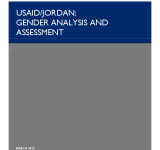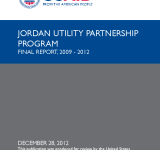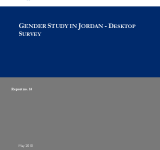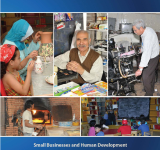The report presents an up-to-date analysis of gender disparities in Jordan to inform development assistance programs by the USAID for the 2013-2017 strategic plan. The assessment report is prepared by the Global Health Technical Assistance Project;; funded by USAID Jordan and therefore;; it is based on a literature review and field work of the 21 focus group discussions held in Amman;; Irbid;; Tafileh and Zarqa. The report establishes that Jordan has begun to transition to a knowledge-based economy with the national advantage as its people. It also points out that despite the investments that have helped address gender equality issues;; Jordan continues to bear low female participation in the labor markets;; gender stereotypes about the role of females and males and conservative cultural norms. The report includes a sector-by-sector analysis;; recommendations;; gender review and an illustrative implementation plan. It concludes with key recommendations on the wide breadth of the USAID Jordan portfolio with a key emphasis on gender issues.
والإناث
This publication aims to summarize and assess the results of the United States Energy Association (USEA)’s Jordan Energy Partnership Project (JUPP);; funded by the USAID. The JUPP is part of the USEA/USAID Energy Utility Partnership Program (EUPP);; which assists developing countries with increasing environmentally sustainable energy production and use and improving the operational efficiency and increased financial viability of their utilities and related institutions. The JUPP focuses on improving the technical and operational efficiency of Jordan’s electric utilities and electric grid. Defining energy insecurity as one of the most significant problems in Jordan;; the report summarizes the program’s activities and assesses their results and impacts. It looks at multiple aspects including the utility participant training and female participation. The results of the publication are increasing system efficiency;; developing customer energy efficiency programs;; increasing corporate efficiency;; supporting capacity building;; reducing electricity losses and power outages;; improving transmission dispatch center operations;; enhancing worker productivity through safety and interconnecting renewable energy and distributed generation. The report concludes with key lessons learned from the projects.
The report presents the findings of a desktop survey conducted to review gender studies in Jordan with an overall goal of the survey as to ensure that gender is adequately addressed throughout project research;; analysis and activities of the Public Action for Water;; Energy and Environment Project (PAP). Under the PAP mandate to encourage water and energy conservation and to support behavior change towards more conservation and efficient practices both at the household level and in the commercial;; industrial and civil society arenas using social marketing behavioral methods;; the report is based on a gender desktop review of existing research on gender and natural resource management in Jordan. It capitalizes on the growing body of research on gender across sectors in Jordan including natural resource management;; to apply and adapt the findings to the PAP project activities. The report concludes with recommendations for the PAP projects such as donor collaboration;; improvement of women’s knowledge of water and energy saving methods;; engagement and creation of women’s participation to promote and support opportunities for small;; women-owned business promoting water and energy saving technologies and promotion of alternative technologies.
This report explores the role of Small and Medium-Enterprises (SME);; as an agent for sustainable human development in Jordan. It analyzes SMEs and their contribution to human development using fours key central pillars of human development;; namely: economic growth that is equitable and pro-poor;; social progress;; participation and empowerment through micro finance;; and environmental sustainability. The report analyses the link between SMEs and empowerment or lack thereof;; with a specific focus on the two issues of employment;; as a tool for empowerment;; and the capacity of SMEs to enhance the position of women within the workforce and home. The report findings were based on extensive research;; a survey of 1;;500 firms and focus groups discussions conducted across the governorates of Jordan. The report proposed general recommendations in terms of institutional coordination;; exports;; cluster groups;; quality standard;; government monitoring;; tax law;; local development;; youth empowerment and the increase of minimum wage.



